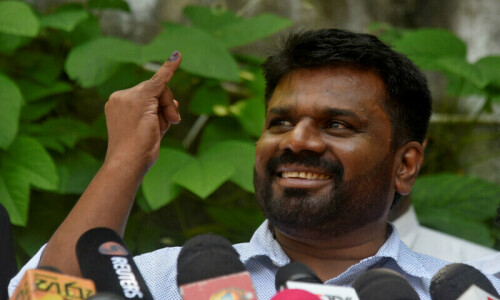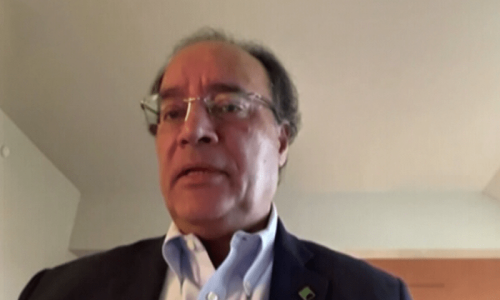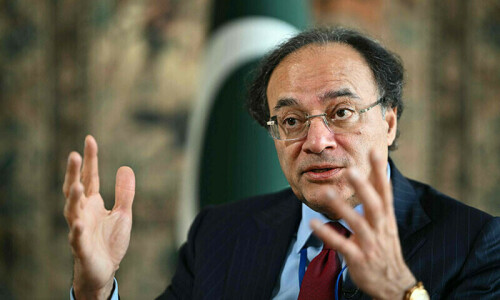While Sri Lanka may not be a model of democracy, the outcome of its presidential elections demonstrates that the country is moving in a democratic direction.
The polls were free and fair, and their results were accepted by all contesting political parties. No less significant was the promise of the newly-elected president of Sri Lanka, Marxist-leaning Anura Kumara Dissanayake, to get some of his pledges made to the voters included in the ongoing International Monetary Fund (IMF) programme. Conceding that the agreement with the IMF is a binding document, the winning party argues that “there is a provision to renegotiate”.
Mr Dissanayake pledged to reduce income taxes that were doubled by the previous government and slash sales taxes on food and medicine.
The electoral victory of a Marxist-leaning candidate, a nominee of the National Peoples Power alliance, can be attributed to Sri Lanka’s poverty rate, which, according to official data, doubled to 25 per cent between 2021 and 2022.
Decentralisation could promote trust, cohesion and equitable access to public services in the long run
“I pledge to demonstrate dedication to protecting and upholding democracy,” said Mr Dissanayake, adding, “The people have called for a different political culture. I am ready to commit to that change. My responsibility is to be a part of a collective effort to end the crisis.” The snap elections for the parliament he dissolved have been announced for Nov 14.
In sharp contrast, with failing hybrid democracy and ensuing political chaos, Pakistan is focused on achieving much-needed macroeconomic stability.
Finance Minister Muhammad Aurangzeb expects that with softer oil prices, a softer dollar and an aggregate interest rate cut by 450 basis points (bps), the current account situation will continue to be in a good position. He noted that the rupee is now under stable conditions, with foreign exchange reserves at a 26-month high on the back of “very resilient and strong remittance flows”.
The sustainability of reforms requires strengthening the electoral system so educated middle-class individuals can be attracted to take part in politics
Financial experts say the current interest rate cut cycle in the developed economies may prompt the State Bank to further lower its policy rate, encouraging growth in the country’s import-driven economy. “Hopefully, Pakistan would see much less ‘stagflation’ in 2024-25”, says Dr Hafiz A. Pasha, “as the economy is showing both positive and negative trends in different indicators”.
On Sept 19, the government rejected all bids for the treasury bills which, Finance Minister Aurangzeb said, was aimed at conveying the message that, “The government was under no desperation to borrow, it would borrow under its own terms.”
The government borrowings surged by a historic high of 100.83pc of total bank deposits in August 2024 to Rs31.03 trillion from Rs30.78tr in the same month last year according to data by the State Bank. The additional borrowing from the central bank and all the depositors’ funds catered to the government’s financial needs.
Mr Aurangzeb said the 450bps would help the government to reduce its single largest expenditure of debt servicing and create room for the banking sector to step up lending aggressively to the private sector.
But, to quote Prime Minister Shehbaz Sharif, economic recovery is tied to political stability. He has, therefore, called upon political parties to prioritise the need for sound economic policies that directly address inflation and improve the living standards of the people. The people, he added, want a reduction in inflation, a solution to their problems and economic betterment.
“We should see beyond the immediate horizon and buy into future changes,” wrote Dr Ishrat Husain in his recent position paper for The Centre for Governance and Research. “Concerns, criticism and scepticism should be addressed.”
The paper suggests that the scope, phasing, timing, implementation strategies, and mitigation measures for the losers from the reforms should be widely discussed and debated. If things do not proceed the way they were conceptualised, corrective actions should be taken considering the feedback received.
Citizen charters, citizen surveys and report cards, citizen panels and focus groups should be used as instruments for receiving regular feedback about the impact of reforms on society and its different segments.
The governance agenda outlined in Dr Husain’s paper is essentially a political exercise that considers the existing power relationships in which the polity is rooted. The balancing of the diverse interests of the various stakeholders involves many politically tough choices that technocrats cannot make.
The sustainability of reforms requires broad consultation, consensus building and communication to articulate the long-term vision.
The point at which this process begins is the strengthening of the political and electoral system, where educated middle-class individuals of calibre and competence can be attracted to take part in politics.
Meaningful empowerment of communities through decentralisation and delegation of authority, in which the local government system plays a crucial role, according to the position paper, would, in the long run, promote greater trust, cohesion and harmony in our society and ensure access to basic public services in an efficient and equitable manner.
Published in Dawn, The Business and Finance Weekly, September 30th, 2024














































Dear visitor, the comments section is undergoing an overhaul and will return soon.